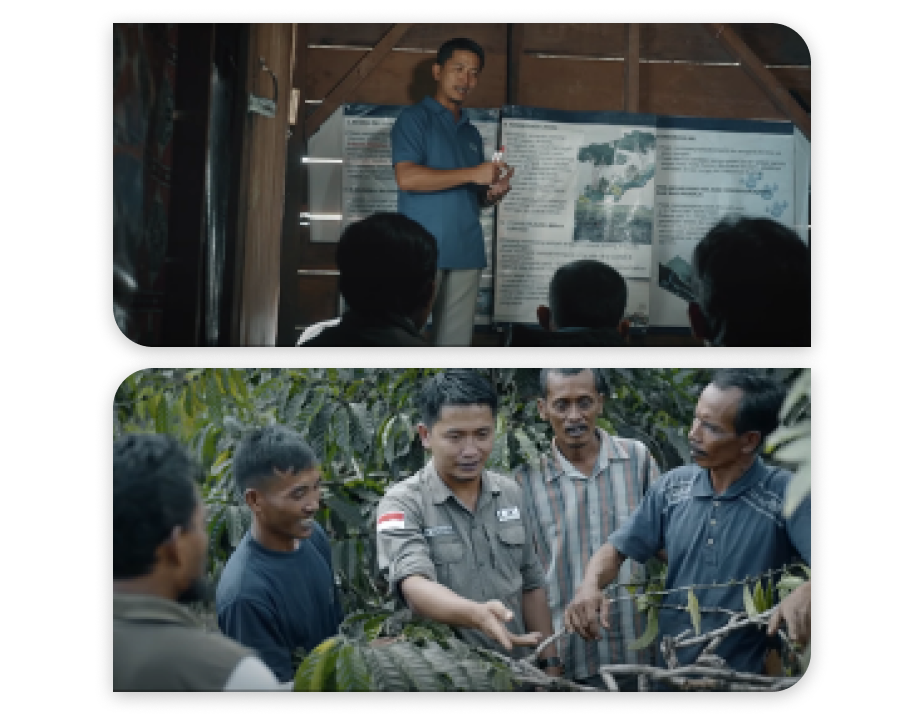WORKING
GROUP - COFFEE
Context:
Coffee Working Group is, a collaborative initiative comprising private sector leaders, government agencies, non-profit organizations, and coffee smallholders, stands united in its unwavering commitment to enhancing the productivity and livelihoods of small-scale coffee farmers through sustainable practices. Coffee WG’s mission is grounded in forging partnerships that empower smallholders with the knowledge and resources needed to improve coffee cultivation while safeguarding the environment. Through initiatives ranging from agroforestry programs to fair trade agreements and access to global markets, the alliance not only bolsters the economic prospects of smallholders but also fosters responsible and eco-friendly coffee farming. This WG exemplifies the power of multi-sector partnerships in effecting positive change, ensuring the longevity of the coffee industry, and bettering the lives of rural communities, all while upholding principles of sustainability and ethical trade.
Indonesia is known for its robust coffee production, with regions like Sumatra, Java, and Sulawesi being renowned for their unique coffee varieties. The industry had been experiencing increased interest in specialty coffee, which had led to improved quality control and the adoption of sustainable farming practices. However, challenges such as aging coffee trees, uneven quality standards, and the impact of climate change posed ongoing concerns. The government and various organizations were working to address these challenges by promoting replanting, supporting smallholders, and encouraging environmentally friendly coffee production.
Activities :
- - Launched a teaching program on income diversification through intercropping with pepper, avocado and chili.
- - Developing a replanting program to increase productivity and adaptability to climate change.
- - Organizing trainings for farmers to qualify for Common Codes for Coffee Community (4C).
- - Create shorter and transparent supply chain aggregators (KUB) to export markets.
- - Piloted mobile banking and cashless transaction.
Impact :
- - 75.935 farmers participating
- - Program spanning 34.087 ha
- - 25% smallholders has access to capacity building
- - Productivity around 776Kg/ Ha
- - Average Income around IDR 1.400.000/month
CASE STUDY - COFFEE - LDC

Louis Dreyfus Company is a leading merchant and processor of agricultural goods, leveraging its global reach and extensive asset network to deliver for its customers around the world safely, responsibly and reliably. Our diversified activities span the entire value chain from farm to fork, across a broad range of business lines. Since 1851 our portfolio has grown to include Grains Oilseeds, Rice, Freight, Global Markets, Coffee,Cotton, Sugar and Juice. LDC commenced operations in Indonesia in 1999 Since then, we have expanded our local business presence steadily over the years and are now active in Grains Oilseeds, Coffee, Cotton and Juice. We have gained a strong foothold and continue to deliver steady growth in Indonesia thanks to 160 years of experience in the industry and key strategic partnerships with local producer.
In Indonesia, LDC is active in the Coffee and Oil Palm sector. For coffee, since 2015 LDC has been an active participant in promoting and implementing Agroforestry activities at farm level together with coffee producers/farmers in Lampung, North Sumatra, and Aceh. LDC has an in-house team of Agronomists and Field Technicians that works closely with farmers both in trainings for good agricultural practices as well as data collection.
BEFORE AND AFTER
INCLUSIVE CLOSED LOOP IMPLEMENTATION
| Indicator | Before | After |
|---|---|---|
| Production/Productivity | Farmers that were trained and adopted GAP were able to improve productivity | |
| Market Access | Through our programs, LDC was able to source from more farmers via local partners. In 2022, LDC purchased >50% of total production capacity of responsibly sourced coffee both in Arabica and Robusta. | |
| Financial | Provided farmers with more than 15 species of tree seeds with higher economic value |
| Indicator | Before | After |
|---|---|---|
| Capability Building | More than 10,000 farmes received GAP training | |
| Social Impact | 1,500 Certified farmers with 4C, Rainforest Alliance. Ongoing: Organic and Fair Trade Improving market access for farmers and providing premiums for coffee |
| Indicator | Before | After |
|---|---|---|
| Innovation and Infrastructure | Improved farm mapping and farmer database | |
| Sustainability | Sustainability certification and traceability |